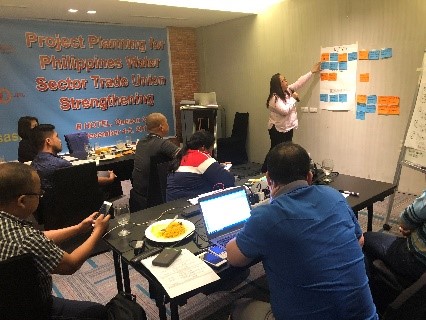
Victor G. Chiong
Strengthening Water Sector Unions in Indonesia and Philippines
The objective of this project is to supporting unions in the water sector in Indonesia and Philippines to grow density and power and secure quality public water services.
In Indonesia, the privatisation of piped water system in the capital, Jakarta, in 1998 involved multinational corporations: Thames Water Overseas and Suez Lyonnaise des Eaux (Ondeo). It has brought about negative consequences: for the workers, who have been seconded, outsourced and generally degraded; for the unions which have been shattered and split; for the users who are paying ever-higher fees for services that are not reliable, and for the public utility which is more indebted.
The privatization of water utility in Jakarta has not only led to the deterioration of the quality of water and water service delivery to community but also to the formation of multiple unions that weakened union power and reduced bargaining leverage of the PSI affiliate SP-PDAM. These processes affected the workers in the water sector operating in a union environment where density, working conditions and bargaining strength have declined.

In the Philippines, the water privatization in 1994 was enforced by the government by signing the concession agreements to Maynilad and Manila Waters to cover the East and West segments of Metro Manila. After the privatization of Metropolitan Waterworks and Sewerage System (MWSS), the water districts in the regions are still within the public management (Government Owned and Controlled Corporation). The privatization created factions among water sector workers. The divide weakened the power of the unions and some forced the unions to be inactive. As a result of privatization, workers were divided and fragmented into multiple unions namely Maynilad Water Supervisory Association, Manila Water Employees Union and those who remained in the water districts under AGWWAS.
In the last few years, unions in the sector have been threatened and have been under high pressure to maintain water district performance. In both countries, trade unions are under attack and weakened through policies supporting privatisation. PSI will provide opportunities in this project to support the following strategy: support to water sector unions to build union strength, increase organising opportunities, build stronger alliance and develop advocacy strategies and possible campaigns on remunicipalisation (Indonesia) and exposing PRIME Water JVAs scheme (Philippines).

This project will address the privatization issues, help unions to develop strategy to build strength, unity and capacities that should result in stronger power to bargain, defend workers’ rights and to defend water as a fundamental right.